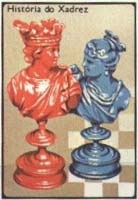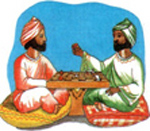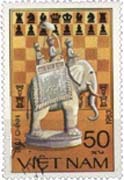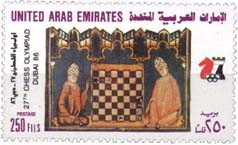draughts
Chess: A Brief History
 So what came first, the chicken or the egg? Well according to current theory, the chicken (and apparently all birds) evolved from dinosaurs. So the answer is the egg came first. It was laid by a dinosaur.
So what came first, the chicken or the egg? Well according to current theory, the chicken (and apparently all birds) evolved from dinosaurs. So the answer is the egg came first. It was laid by a dinosaur.
So what came first, Chess or Draughts? I’ll rephrase that. Which is oldest, Chess or Draughts? I was asked that very question back in 1990 when I was part of a shop team taking part in the Sunday Post quiz.
The shop in question was Games Master on Forest Road. Sadly no longer there. It turned into a Photocopying shop which in turn became a Sandwich Bar and as I write it’s a closed Sandwich Bar. Perhaps they should have combined in a business venture and made it a Photocopying Sandwich Bar. A place where you get your photocopying done and order a sandwich. They could have had their own brand of snack: an A4 sandwich, a double sided corned beef roll, a Xerox salad…
 Where was I? Oh Yes, What came first Games Master or the Sandwich Bar?
Where was I? Oh Yes, What came first Games Master or the Sandwich Bar?
No. Which is the oldest, Chess or Draughts?
The team looked at me. I was the Chess player. I looked at them and confidently stated ‘Chess.’
‘Wrong,’ said the girl from the Sunday Post. ‘A form of Draughts was discovered in the ancient pyramids of Egypt.’
So the shop that sold games got the only question on games wrong!
That minor mistake aside, though it took me years to live it down, we did not too bad and finished with a final score of 75%. I still think the girl from the Sunday Post got it wrong. Have you ever seen an Egyptian hieroglyph of King Tut and Cleopatra playing Draughts? Neither have I.
Anyway, Draughts aside, where did Chess come from? Introducing the Scottish writer Duncan Forbes (1798-1868). His History of Chess published in 1860 claimed the game is over 5,000 years old. He then stepped back and soaked up the acclaim. Later writers and historians checked his sources and found he had led everyone right up the proverbial garden path, round the garden tree and out the garden gate. ‘The false prophet has taken us all in,’ wrote one dismayed historian. ‘He did not even make good use of the material known to him,’ wrote the American J.G.White (1845-1928), who owned at the time of his death the world’s largest Chess library. A staggering 12,000 books.
 Things became clear in 1913 when Harold James Ruthven Murray (1868-1955) wrote his 900 page History of Chess. He too bemoaned the false trail left by Forbes and actually hinted that Forbes must have known what he was writing was wrong.
Things became clear in 1913 when Harold James Ruthven Murray (1868-1955) wrote his 900 page History of Chess. He too bemoaned the false trail left by Forbes and actually hinted that Forbes must have known what he was writing was wrong.
Murray’s effort took him 14 years of inspired research. He was assisted by J. G. White who gave him free access to his library, and Murray even learned Arabic so he could study the earliest references to Chess in literature (approx. AD 600). I attempted to read Murray’s book. It’s a monster to read, it was like reading treacle and I have to admit I gave up.
As well as Chess, Murray actually wrote a book on the history of Draughts. Perhaps if I had read that, then the team would have got 80 0n the Sunday Post Quiz.
So here is what we know. I got this not from Murray: as I said before, I slung the book behind the settee and watched television instead. Imagine Dickens without the story, then you have Murray. This I have gleaned from The Oxford Companion to Chess by David Hooper and Kenneth Whyld. In my opinion the best Chess book ever written.
 It starts in India around AD 600 with a game called Chaturanga. By starts, I mean it is the first documented proof such a game existed. Some sources claim the game is 1,500 years old. But there is no proof. It’s not mentioned in the Bible. Which is a pity. I would have loved to have seen what opening Jesus would play as Black against 1.e4.
It starts in India around AD 600 with a game called Chaturanga. By starts, I mean it is the first documented proof such a game existed. Some sources claim the game is 1,500 years old. But there is no proof. It’s not mentioned in the Bible. Which is a pity. I would have loved to have seen what opening Jesus would play as Black against 1.e4.
Perhaps they did play Chess in Biblical times and it’s just been overlooked or badly translated. The three wise men could have brought the baby Jesus gold, frankincense and a Chess set. Perhaps Lazarus beat Jesus from a lost position and came back from the dead. David slew Goliath with a pawn.
Come to think of it Draughts is not mentioned either. Egypt certainly gets a mention but no Draughts. I really must find that Sunday Post girl and get our score altered.
 From India it moved to Persia and from there it took three routes to Europe: to Spain via the Moors, to Sicily by the Islamic conquerors and to various other parts by European traders travelling from Byzantine. By 1000 the game was widely known throughout Europe.
From India it moved to Persia and from there it took three routes to Europe: to Spain via the Moors, to Sicily by the Islamic conquerors and to various other parts by European traders travelling from Byzantine. By 1000 the game was widely known throughout Europe.
The Chess pieces consisted of:
1 Rajah , what we now call a King.
1 Mantri or Counsellor, that later became a Queen.
2 Gaja, who later became Bishops.
2 Asva, the Horses or Knights.
2 Ratha, the Chariots, later called Rooks.
8 Pedati, who are the infantry or Pawns.
In Spain and Italy around 1475 the game underwent some major changes when the Latin Europeans decided the play needed speeding up. The Gaja, who could only move 3 squares, was given unlimited scope and became the modern day Bishop. The Pawn was allowed to move two squares on its first move and promote to any piece, apart from a King, upon reaching the eighth rank. The King, Rook and Knight were left unchanged have always moved as they do today.
The most radical change was the Counsellor, which we now know as the Queen. The Counsellor moved the same as a King. One square at a time. They renamed it a Queen, after Queen Isabella who, along with her husband Ferdinand, ruled Castile and Aragon from 1474 to 1504. The ‘new’ Queen and was given the moves of a Rook and Bishop combined, thus making her the most powerful piece on the board. Castling and en passant were added and that is the game we know today as Chess.
 The game still maintains a link to its multicultural past through the Persian language. Shah means the King. Mat means defeated, helpless, dead. Thus Shahmat: Checkmate.
The game still maintains a link to its multicultural past through the Persian language. Shah means the King. Mat means defeated, helpless, dead. Thus Shahmat: Checkmate.
So that’s it, the history of Chess in a chestnut shell.
I wonder what the dinosaur thought when it saw a chicken hatching from the egg it had laid? Maybe that’s what happened to the dinosaurs. All their eggs hatched into birds and simply flew off.
Copyright Geoff Chandler 2004

Comments